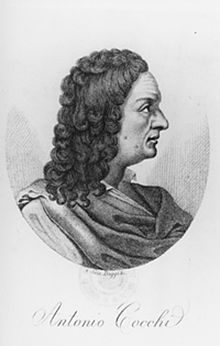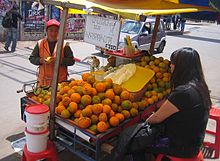Antonio Cocchi
Appearance

Antonio Cocchi (3 August 1695 – 1 January 1758) was an Italian physician, naturalist and writer. He was best known for his work on anatomy.
| This physician article is a stub. You can help out with Wikiquote by expanding it! |
Quotes
[edit]The Pythagorean Diet: for the Use of the Medical Faculty
[edit]- Original title: Del vitto pitagorico per uso della medicina. Quotes from The Ethics of Diet by Howard Williams (University of Illinois Press, 2003, ch. Cocchi).
- True and constant vigour of body is the effect of health, which is much better preserved with watery, herbaceous, frugal, and tender food, than with vinous, abundant, hard, and gross flesh. And in a sound body, a clear intelligence, and desire to suppress the mischievous inclinations, and to conquer the irrational passions, produces true worth.
- The vulgar opinion, then, which, on health reasons, condemns vegetable food and so much praises animal food, being so ill-founded, I have always thought it well to oppose myself to it, moved both by experience and by that refined knowledge of natural things which some study and conversation with great men have given me. And perceiving now that such my constancy has been honoured by some learned and wise physicians with their authoritative adhesion, I have thought it my duty publicly to diffuse the reasons of the Pythagorean diet, regarded as useful in medicine, and, at the same time, as full of innocence, of temperance, and of health. And it is none the less accompanied with a certain delicate pleasure, and also with a refined and splendid luxury, if care and skill be applied in selection and proper supply of the best vegetable food, to which the fertility and the natural character of our beautiful country seem to invite us.
- I wished to show that Pythagoras, the first founder of the vegetable regimen, was at once a very great physicist and a very great physician; that there has been no one of a more cultured and discriminating humanity; that he was a man of wisdom and of experience; that his motive in commending and introducing the new mode of living was derived not from any extravagant superstition, but from the desire to improve the health and the manners of men.
The Pythagorean diet, of vegetables only, conducive to the preservation of health, and the cure of diseases
[edit]


- Discourse on Pythagorean diet delivered by Cocchi at Florence in August 1743
- The following Discourse having been received in Italy with a great deal of Approbation... The Author was some years ago in England, is now Keeper of the Great Luke of Tufcany’j Museaum, a Fellow of our Royal Society, as well as of the College of Physicians in Florence, and will be found to speak of the English Nation in the highest Terms of Regard. [Preface]
- Pythagoras was certainly one of the greatest geniuses that ever Human Nature produc’d.
- We see that their most worthy Physicians and Philosophers were also of the same Opinion. Antonins Musa, who merited a public Statue in Rome ( i) for the perfect and happy Cure perform’d by him upon Augustus, made of Lettice (2) principally therein: and by his Advice it was that this great Prince came into that sparing and simple Pythagorean Diet, which Suetonius (3) minutely describes, confiding principally of Bread topp’d in cold Water, and of some Sorts of Apples of an agreeable and vinous Acidity. Horace also made great Use of the Pythagorean Diet, as he tells us in may Places of his judicious and most excellent Poems, therein following, as we suppose, the Advice of the fame Musa, who was his Physician.
- We find the same Preference given to vegetable Food by all the other ancient Latin Writers, who had any Understanding of the Nature of Things, and by Galen, and Plutarch, who has shown more particularly, perhaps than any one, the Danger of animal Diet, in his Precepts of Health, and in his Discourses on eating Flesh.
- Nor has our Age been destitute of Examples of Men, brave from the Vigour both of their Bodies and Minds, who at the same time have been Drinkers of Water, and Eaters of Fruits and Herbs. In certain Mountains of Europe, there are People, even at this Time, who live on Herbs only and Milk; yet are very invincible and stout; and the Japanese (who are very resolute in dispelling Dangers, and even Death itself) abstain from all animal Food; and there are besides a thousand Examples known to every one, of Nations and Persons of great Temperance, joined with all other consummate Virtues.
- I have thought it my Duty thus publicly to set forth the Reasons for the Pythagorean Diet, considered as fit to be used in Medicine, and at the same time perfectly innocent, well adapted to Temperance, and greatly beneficial and conducive to Health.
- Pythagoras.. was both a very great Philosopher and an able Physician.. whole Motive for the so much commending and introducing his Way of Life, was not any Superstition or Extravagance; but a Desire to be assisting to the Health and good Behaviour of Mankind...
- I mean the Pythagorean Diet, which consisted (i ) in the free and universal Ufe of every Thing that is vegetable, tender and fresh, which requires little or no Preparation to make it fit to eat, such as Roots, Leaves, Flowers, Fruits and Seeds: And in a general Abstinence from every Thing that is animal, whether it be fresh or dried. Bird, Beast, or Fish.
- Milk and Honey made up part of this Diet: Eggs, on the contrary, were excluded, Their Drink was to be the purest Water; neither Wine nor any vinous Liquor.
- He forbid, in Flesh itself, that of carnivorous Animals above all other Kinds; and, for the same Reason, that of Wild Boars, and what was taken in Hunting
- His two only Meals in a Day, equivalent to our Collations, were for the most Part of Bread only...
- One of these Abstinences, rigorously and universally observed in Egypt, was that from Beans
- Abstinency from Beans, it is now plain, from the general Sense of all the antient Writers, that this Prohibition of his was allegorical, and that it would be now a vain Undertaking to attempt finding out the literal Sense of it, since those who knew it were so industrious to keep it secret.
- And as we find, on the other hand, that Pythagoras made no Difficulty of eating them, and that he extended his Prohibition concerning Food even to other kinds... also to old Cocks, plowing Oxen, and many other Substances
- It seems much more reasonable to suppose, that the symbolical Prohibition of Beans was something entirely different, of an important and secret Signification; and that the real Abstinences intended, were indeed first prescribed by others before him, and for other Ends
- I find in his original Writings consisted in drinking largely of Lemon and Orange Juice, or in some Cafes even of Verjuice with a great deal of Water: and in taking no other Food but the Crumb of Bread, boiled or sop’d in fair Water.
- How effectual then this Pythagorean Diet is, towards obtaining the End for which, as has been said, it was principally intended by its Author; that is, for preserving the present Health of the Body... may easily be understood by whoever will but consider the Nature and Faculties of our Bodies, as also of the Aliments which sustain them
- I have always named fresh Vegetables, because the dry’d ones have almost all the bad Qualities of Animal Food, particularly as their earthy and oleaginous particles are too strongly coherent together.
- It being far more reasonable to believe, that wise Man, who was... of the Truth of the Phenomenon as we are, was likewise no less capable of understanding the true Reason thereof founded on the Elasticity or natural Contraction of the Fibres whereof the human Body is composed... A Belief that Health is the principal part or Basis of human Happiness, and that it depends on a Harmony, that is, a Correspondence of the several Motions with the Powers that produce them...
See also
[edit]- A plea for vegetarianism, and other essays by Henry Stephens Salt (1886)
- Veganism
- Vegetarianism
- Vegetarianism and Occultism by Charles W. Leadbeater (1913)

